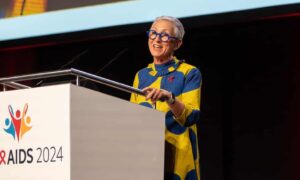
When the doctor behind the trial of a new HIV prevention drug heard the results, she could not contain her emotions. “I literally burst into tears,” said Prof Linda-Gail Bekker.
“I’m 62, I’ve lived through this epidemic … I had family members who died of HIV, as did many, many Africans – many people around the world,” she said.
The problem of how to prevent HIV infection, particularly in teenage girls and young women, had seemed “intractable”, Bekker said. But lenacapavir had offered thousands of women aged 16 to 25 in South Africa and Uganda 100% protection.
The drug could give young women greater agency over their lives and sexuality, she hopes, and potentially eliminate mother-to-child transmission of the virus.
The results of the Purpose 1 trial prompted a standing ovation for Bekker, chief executive at the Desmond Tutu Health Foundation, when she presented them at the Aids 2024 conference in Munich this week.
“Even now, when I look at that [results] graph, I get shivers,” Bekker said.
Aids first emerged in 1981 as a terrifying mystery disease that was then in effect a death sentence. It took until 1983 before scientists identified that the HIV virus was behind it, and another two years before the first test was developed to detect the virus.
